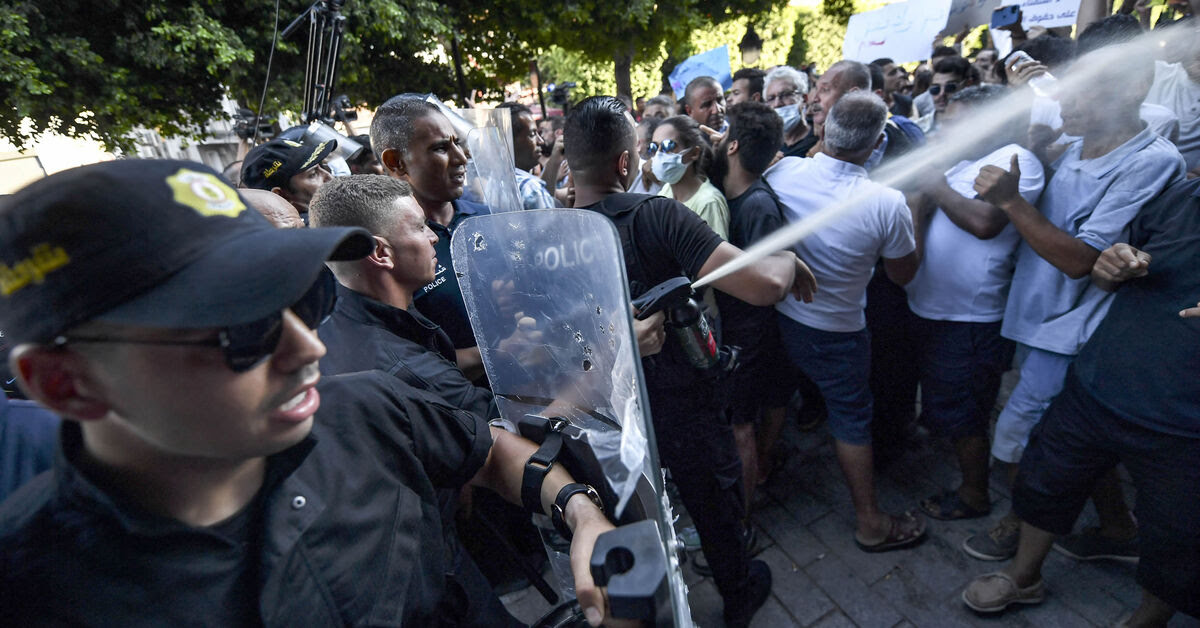TUNIS, Tunisia – Following the August 10 meeting, Tunisian police unions came into conflict with Tunisian President Kais Saied after he rejected his call to create a unified union structure called the “Tunisian Union of General Internal Security Forces”.
This was the response to Saied’s request during an August meeting with Interior Minister Tawfiq Sharaf El-Din. Saied urged the police to be committed to protecting people and property and guaranteeing freedom of expression. In a statement issued by the presidency on the same day, Saied acknowledged that while the right of security personnel to unite is a constitutional right, the constitution itself provides that this right does not include organizing a strike and that failure to provide security during protests is a disguised strike and a breach of professional obligations.
Saied’s proposal was in response to human rights lawyers in Tunisia calling for the dissolution of police unions following events believed to have been caused by police unions. For example, the police intervened in artistic performances and threatened to declare security in default.
This against the backdrop of police officers’ refusal to protect a theater performance by actor Lotfi al-Abdali on August 7, alleging it contained words and gestures that offend morality. Many Tunisians viewed this incident as a sign of police interference and interference in making decisions beyond their jurisdiction.
The Tunisian League of Human Rights warned in a statement on Aug. 9 about “the dangers of the security apparatus tasked with securing artistic performances turning into a censorship body controlling public taste and freedom of art and creativity until it point that it mimics a parallel judicial body.”
In a statement to the national radio station on Aug. 8, spokesman for the National Syndicate of Internal Security Forces Shukri Hamadeh said: “Chapter 226 of the Penal Code criminalizes indecency. From now on we will not accept being a party to a moral crime.”
He noted that the security forces would withdraw “from any show that offends public taste”. The statement sparked widespread controversy in the cultural arena and on social media platforms.
Hamadeh told journalists that the security unions rejected Saied’s decision to create a united union structure under the Tunisian Union of General Internal Security Forces, as it affects freedom of union work and the right to organize.
He pointed out that the allegations against the unions of interference and pressure on the state are false. He marveled at the silence of human rights and civil society organizations about the material and moral attacks on security personnel in the course of their duties.
Hamadeh added that police unions operate within the framework of their constitutional rights and reject any form of violence and torture in prisons that affects the freedom of individuals. They hold everyone involved in torture crimes accountable.
On February 1, 2021, during a protest in the city of Sfax, the Secretary General of the National Syndicate of Internal Security Forces, Zubeir Louhichi, asked the security forces not to hold back. He also launched a fierce attack on those he called “atheists” and “left-wing enemies of Islam.” He accused human rights defenders and journalists of espionage.
On the other hand, Jamal Musallem, head of the Tunisian League for Human Rights, said he fears for the future of republican security in Tunisia in the face of the ubiquity and harassment of police unions, as well as their inhumane torture practices in prisons. . and detention centers, and the general culture of impunity in which they operate.
Musallem said these unions have a responsibility to defend the rights of their members to improve their working conditions and should not be an instrument in the hands of politicians.
Journalist and political analyst Mohamed Bou Oud said the police unions that are now defying the Ministry of Interior and the President of the Republic and even interfering with the arts, morals and people’s tastes must face determined, strict and bold before creating security and political threats that affect people’s lives, the stability and the security of the country.
In 2021, Tunisia’s police unions under the government of Hisham el-Mechichi, formed by the Islamist Ennahda movement and its allies, were sharply criticized by human rights groups for using violence to repress protesters taking to the streets over the economic crisis. They protested against inflation, high unemployment rates, the government’s suspension of employment in the public sector and the phasing out of subsidies.
The International Monetary Fund called for reducing the cost of subsidies and limiting workers’ wages. The union has categorically rejected such measures because they affect the purchasing power of citizens.
Political analyst Mohamed Doueib said that the public dispute between Saied and the police unions does not serve the stability of the country. He said: “The president’s call for unions to group under one umbrella is a step that will help unite the security forces and make them more effective.”
A draft law to protect security personnel had previously sparked controversy after it was presented to parliament in 2015. At the time, it was withdrawn for further consideration and has been suspended until today due to concerns from human rights groups that this law could be used to promote a culture of impunity and grant security personnel absolute immunity. The police unions insisted on passing it on to improve their performance and fight terrorism within an arsenal of laws that protect them.
It is important to note that these police unions were established under Decree No. 42 of 2011 of 25 May 2011, first issued under Prime Minister Beji Caid Essebsi. The decree gave police unions the green light to organize, operate and even appear on TV channels to defend their rights.
